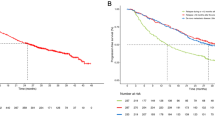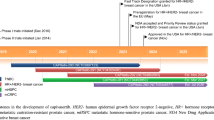Abstract
To determine the feasible dose and schedule for everolimus, an oral mTOR inhibitor, combined with vinorelbine and trastuzumab for patients with HER2-overexpressing metastatic breast cancer pretreated with trastuzumab. In this phase Ib multicenter, Bayesian dose-escalation study, 50 patients received everolimus 5 mg/day, 20 mg/week, or 30 mg/week plus vinorelbine (25 mg/m2 on day 1 and 8 every 3 weeks) and trastuzumab (2 mg/kg weekly). Endpoints included end-of-cycle-1 dose-limiting toxicity (DLT) rate (primary endpoint), safety, relative dose intensity, overall response rate (ORR), and pharmacokinetics. Grade 3/4 neutropenia was the most common end-of-cycle-1 DLT and occurred in 10 of 30 and 4 of 14 patients in the 5 mg/day and 30 mg/week cohorts, respectively. Other end-of-cycle-1 DLTs included single cases of febrile neutropenia, grade 3 stomatitis with concomitant fatigue, grade 2 stomatitis, grade 3 anorexia, and grade 2 acneiform dermatitis, all in the 5-mg/day cohort. Based on the recorded DLTs and global safety, everolimus 5 mg/day and 30 mg/week were chosen as the optimal dose levels for the daily and weekly arms. Forty-seven patients were evaluable for efficacy. ORR was 19.1%, with a disease control rate of 83.0% and median progression-free survival of 30.7 weeks. No drug interaction was observed between everolimus and vinorelbine. Everolimus combined with weekly vinorelbine and trastuzumab generally was well tolerated and had encouraging antitumor activity in heavily pretreated patients with HER2-overexpressing metastatic breast cancer that progressed on trastuzumab (NCT00426530).


Similar content being viewed by others
References
Slamon DJ, Leyland-Jones B, Shak S et al (2001) Use of chemotherapy plus a monoclonal antibody against HER2 for metastatic breast cancer that overexpresses HER2. N Engl J Med 344:783–792
Gschwind A, Fischer OM, Ullrich A (2004) The discovery of receptor tyrosine kinases: targets for cancer therapy. Nat Rev Cancer 4:361–370
Rydén L, Landberg G, Stål O et al (2008) HER2 status in hormone receptor positive premenopausal primary breast cancer adds prognostic, but not tamoxifen treatment predictive, information. Breast Cancer Res Treat 109:351–357
NCCN Clinical Practice Guidelines in Oncology™. Breast Cancer (Version 1.2010). National Comprehensive Cancer Network, Inc. http://www.nccn.org
Marty M, Cognetti F, Maraninchi D et al (2005) Randomized phase II trial of the efficacy and safety of trastuzumab combined with docetaxel in patients with human epidermal growth factor receptor 2-positive metastatic breast cancer administered as first-line treatment: the M77001 study group. J Clin Oncol 23:4265–4274
American Cancer Society: Breast Cancer Facts & Figures 2007–2008. http://www.cancer.org/acs/groups/content/@nho/documents/document/bcfffinalpdf.pdf. Accessed 30 Sept 2010
Nahta R, Esteva FJ (2003) HER-2-targeted therapy: lessons learned and future directions. Clin Cancer Res 9:5078–5084
von Minckwitz G, du Bois A, Schmidt M et al (2009) Trastuzumab beyond progression in human epidermal growth factor receptor 2-positive advanced breast cancer: a german breast group 26/breast international group 03–05 study. J Clin Oncol 27:1999–2006
Geyer CE, Forster J, Lindquist D et al (2006) Lapatinib plus capecitabine for HER2-positive advanced breast cancer. N Engl J Med 355:2733–2743
Nagata Y, Lan KH, Zhou X et al (2004) PTEN activation contributes to tumor inhibition by trastuzumab, and loss of PTEN predicts trastuzumab resistance in patients. Cancer Cell 6:117–127
Berns K, Horlings HM, Hennessy BT et al (2007) A functional genetic approach identifies the PI3K pathway as a major determinant of trastuzumab resistance in breast cancer. Cancer Cell 12:395–402
Ellard SL, Clemons M, Gelmon KA et al (2009) Randomized phase II study comparing two schedules of everolimus in patients with recurrent/metastatic breast cancer: NCIC Clinical Trials Group IND.163. J Clin Oncol 27:4536–4541
Awada A, Cardoso F, Fontaine C et al (2008) The oral mTOR inhibitor RAD001 (everolimus) in combination with letrozole in patients with advanced breast cancer: results of a phase I study with pharmacokinetics. Eur J Cancer 44:84–91
Baselga J, Semiglazov V, van Dam P et al (2009) Phase II randomized study of neoadjuvant everolimus plus letrozole compared with placebo plus letrozole in patients with estrogen receptor-positive breast cancer. J Clin Oncol 27:2630–2637
Tabernero J, Rojo F, Calvo E et al (2008) Dose- and schedule-dependent inhibition of the mammalian target of rapamycin pathway with everolimus: a phase I tumor pharmacodynamic study in patients with advanced solid tumors. J Clin Oncol 26:1603–1610
Andre F, Campone M, O’Regan R, Manlius C, Massacesi C, Sahmoud T, Mukhopadhyay P, Soria JC, Naughton M, Hurvitz SA (2010) Phase I study of everolimus plus weekly paclitaxel and trastuzumab in patients with metastatic breast cancer pretreated with trastuzumab. J Clin Oncol. 2010 Oct 25. [Epub ahead of print]
Chan A (2007) A review of the use of trastuzumab (Herceptin) plus vinorelbine in metastatic breast cancer. Ann Oncol 18:1152–1158
De Maio E, Pacilio C, Gravina A et al (2007) Vinorelbine plus 3-weekly trastuzumab in metastatic breast cancer: a single-centre phase 2 trial. BMC Cancer 7:50
Schilling G, Bruweleit M, Harbeck N et al (2009) Phase II trial of vinorelbine and trastuzumab in patients with HER2-positive metastatic breast cancer. A prospective, open label, non-controlled, multicenter phase II trial (to investigate efficacy and safety of this combination chemotherapy). Investig New Drugs 27:166–172
Tokudome N, Ito Y, Hatake K et al (2008) Trastuzumab and vinorelbine as first-line therapy for HER2-overexpressing metastatic breast cancer: multicenter phase II and pharmacokinetic study in Japan. Anticancer Drugs 19:753–759
Di Lauro V, Murrone A, Bidoli E et al (2008) Trastuzumab and vinorelbine as highly effective and safe therapy for HER-2-overexpressing metastatic breast cancer. A single institution experience. Tumori 94:464–468
Andersson M, Lidbrink E, Wist E et al (2010) Similar outcome in a randomized phase III trial comparing docetaxel versus vinorelbine both combined with trastuzumab as first line treatment for metastatic or locally advanced human epidermal growth factor receptor 2 (HER2) positive breast cancer. Eur J Cancer 8:55 Abstract 8N
Neuenschwander B, Branson M, Gsponer T (2008) Critical aspects of the Bayesian approach to phase I cancer trials. Stat Med 27:2439
Cheung Y, Chappell R (2000) Sequential designs for phase I clinical trials with late-onset toxicities. Biometrics 56:1177–1182
National Cancer Institute (2006) Common Terminology Criteria for Adverse Events (CTCAE) v3.0. http://ctep.cancer.gov/protocolDevelopment/electronic_applications/docs/ctcaev3.pdf. Accessed 30 Sept 2010
Jaffe CC (2004) Measures of response: RECIST, WHO, and new alternatives. Nat Rev Cancer 4:335–348
Tanaka C, O’Reilly T, Kovarik JM et al (2008) Identifying optimal biologic doses of everolimus (RAD001) in patients with cancer based on the modeling of preclinical and clinical pharmacokinetic and pharmacodynamic data. J Clin Oncol 26:1596–1602
Lane HA, Wood JM, McSheehy PMJ et al (2009) mTOR inhibitor RAD001 (everolimus) has antiangiogenic/vascular properties distinct from a VEGFR tyrosine kinase inhibitor. Clin Cancer Res 15:1612–1622
Dumont FJ, Staruch MJ, Koprak SL et al (1990) Distinct mechanisms of suppression of mustine T cell activation by the related macrolides FK-506 and rapamycin. J Immunol 144:251–258
Manning BD (2004) Balancing Akt with S6K: implications for both metabolic diseases and tumorigenesis. J Cell Biol 167:399–403
Nahta R, Esteva J (2006) HER2 therapy: molecular mechanisms of trastuzumab resistance. Breast Cancer Res 8:215
Lindström L, Howell S, Åström G et al (2010) Controversies in the management of metastatic breast cancer: biologic evaluation of breast cancer: should metastases be biopsied? American Society of Clinical Oncology (ASCO) Educational Book. American Society of Clinical Oncology (ASCO), Alexandria
Burstein HJ, Kuter I, Campos SM et al (2001) Clinical activity of trastuzumab and vinorelbine in women with HER2-overexpressing metastatic breast cancer. J Clin Oncol 19:2722–2730
Burstein HJ, Harris LN, Marcom PK et al (2003) Trastuzumab and vinorelbine as first-line therapy for HER2-overexpressing metastatic breast cancer: multicenter phase II trial with clinical outcomes, analysis of serum tumor markers as predictive factors, and cardiac surveillance algorithm. J Clin Oncol 21:2889–2895
Motzer RJ, Escudier B, Oudard S, The RECORD-1 Study Group et al (2010) Phase 3 trial of everolimus for metastatic renal cell carcinoma: final results and analysis of prognostic factors. Cancer 116:4256–4265
Herceptin [package insert] (2009) http://www.gene.com/gene/products/information/pdf/herceptin-prescribing.pdf. Accessed 30 Sept 2010
Vinorelbine Injection USP [package insert] (2005) http://www.bedfordlabs.com/BedfordLabsWeb/products/inserts/VRLB-P01.pdf. Accessed 30 Sept 2010
Burstein HJ, Keshaviah A, Baron AD et al (2007) Trastuzumab plus vinorelbine or taxane chemotherapy for HER2-overexpressing metastatic breast cancer: the trastuzumab and vinorelbine or taxane study. Cancer 110:965–972
Acknowledgments
Research support was provided by Novartis Pharmaceuticals Corporation, East Hanover, NJ, USA. Editorial support was provided by Scientific Connexions and funded by Novartis Pharmaceuticals. We thank the patients, their families, and the study personnel: Claire Senay, Corinne Manlius, Karen Osborne, Philippe Thevenaz (clinical); Ilona Pylvaenaeinen, Pabak Mukhopadhyay (statistics); Penny Phillips (biomarkers); and Shweta Urva, Wing Cheung (pharmacokinetics).
Conflicts of interest
G. Jerusalem: Consultant/advisory role, honoraria, and research funding from Novartis, A. Fasolo: No conflicts to disclose, V. Dieras: Consultant/advisory role for Novartis, F. Cardoso: Consultant/advisory role, honoraria, and research funding from Novartis, J. Bergh: Consultant/advisory role for Affybodies, Amgen, AstraZeneca, Bayer, Bristol-Myers Squibb, GlaxoSmithKline, i3 Innovus, Onyx/Bayer, Pfizer, Roche, Sanofi-Aventis, and Tapestry Network on behalf of Asklepios Medicin Hb; honoraria from Amgen, AstraZeneca, Novartis, Pfizer, Roche, and Sanofi-Aventis on behalf of Asklepios Medicin Hb; research funding from Pfizer (grant to Karolinska University Hospital enabling substudy of SUN 1064 with biopsies, PET, and gene expression profiling); Karolinska has received grants or funding from Merck (array and SNP studies) for which Prof. Bergh served as principal investigator, L. Vittori: Employee of Novartis (Clinical Trial Head); stock ownership in Novartis, Y. Zhang: Employee of Novartis (Senior Biostatistician), C. Massacesi: Employee of Novartis (Global Clinical Leader); stock ownership in Novartis, T. Sahmoud: Employee of Novartis (Executive Medical Director); stock ownership in Novartis, L. Gianni: Consultant/advisory role for Roche, Genentech, Wyeth, Novartis, Eisai, Pfizer, Millennium, Takeda, Sanofi-Aventis, Boehringer-Ingelheim, and Wellcare.
Author information
Authors and Affiliations
Corresponding author
Electronic supplementary material
Below is the link to the electronic supplementary material.
Rights and permissions
About this article
Cite this article
Jerusalem, G., Fasolo, A., Dieras, V. et al. Phase I trial of oral mTOR inhibitor everolimus in combination with trastuzumab and vinorelbine in pre-treated patients with HER2-overexpressing metastatic breast cancer. Breast Cancer Res Treat 125, 447–455 (2011). https://doi.org/10.1007/s10549-010-1260-x
Received:
Accepted:
Published:
Issue Date:
DOI: https://doi.org/10.1007/s10549-010-1260-x




